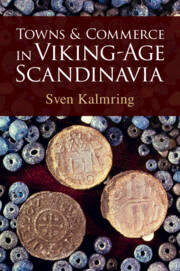Book contents
- Towns and Commerce in Viking-Age Scandinavia
- Additional material
- Towns and Commerce in Viking-Age Scandinavia
- Copyright page
- Epigraph
- Contents
- Plates
- Figures
- Maps
- Acknowledgements
- Abbreviations
- Maps
- 1 Introduction
- 2 The Viking-Age Town
- 3 The Viking World
- 4 Cult, Jurisdiction and Markets
- 5 Local Society and Viking-Age Towns
- 6 An Urbanisation Based on Harbours
- 7 Jurisdiction and Taxes
- 8 Free Trade within Narrow Boundaries
- 9 Special Economic Zones of Their Time
- 10 Development after the Inception Phase
- 11 Discussion: Hedeby’s Abandonment and the Foundation of Slesvig
- 12 Summary and Conclusions
- References
- Index
- Plate Section
5 - Local Society and Viking-Age Towns
Published online by Cambridge University Press: 04 January 2024
- Towns and Commerce in Viking-Age Scandinavia
- Additional material
- Towns and Commerce in Viking-Age Scandinavia
- Copyright page
- Epigraph
- Contents
- Plates
- Figures
- Maps
- Acknowledgements
- Abbreviations
- Maps
- 1 Introduction
- 2 The Viking-Age Town
- 3 The Viking World
- 4 Cult, Jurisdiction and Markets
- 5 Local Society and Viking-Age Towns
- 6 An Urbanisation Based on Harbours
- 7 Jurisdiction and Taxes
- 8 Free Trade within Narrow Boundaries
- 9 Special Economic Zones of Their Time
- 10 Development after the Inception Phase
- 11 Discussion: Hedeby’s Abandonment and the Foundation of Slesvig
- 12 Summary and Conclusions
- References
- Index
- Plate Section
Summary
As outlined in previous chapters, the emerging urban communities in Viking-age Scandinavia would not have been an integral part of the rural agrarian society that surrounded them. Instead, they coexisted only on the fringes of these otherwise traditional societies. This was not only true in Scandinavia but also in the Carolingian Empire, as described by Verhaeghe (2005: 283): ‘But on the whole, the urban world was still very much a sideline in an essentially rural- and land-based economy and power structure.’ As indicated in the Introduction, Viking-age towns were not characterised by local populations but by their vast multi-ethnic ones. This is evident in the town of Birka, which seems to have had its own assembly site, a clear indication that it was separated from the surrounding rural communities. Another important dissimilarity is the continuous engagement in market trade and involvement in long-distance trade as a primary purpose, instead of seasonal fairs. How these emerging towns – as expressions of ‘supermodernity’ (Augé 1995) – were embedded in this environment and managed to coexist with a traditional society will be demonstrated by discussing the duality of early towns and royal estates, as well as their geographical position in relation to the existing power structures.
- Type
- Chapter
- Information
- Towns and Commerce in Viking-Age Scandinavia , pp. 50 - 61Publisher: Cambridge University PressPrint publication year: 2024

